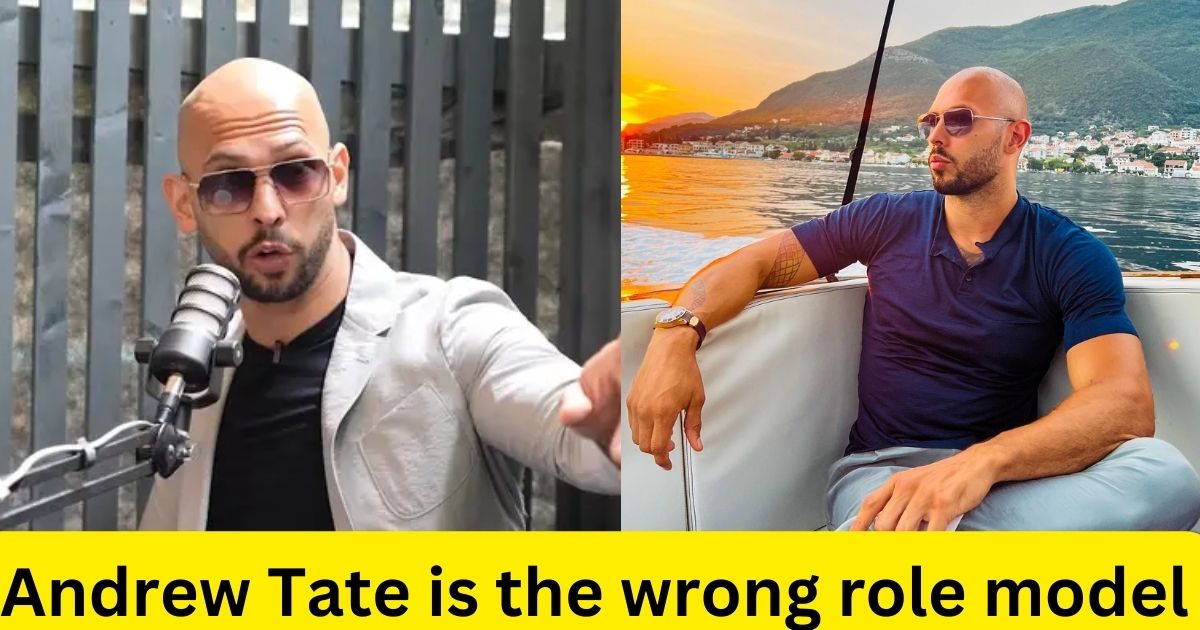The phrase What does it mean to be a man? Andrew Tate is the wrong role model that encapsulates a significant societal discourse surrounding masculinity and the influence of certain individuals in shaping perceptions of manhood.
At its core, the question interrogates the essence of masculinity, prompting reflections on the qualities, values and behaviors associated with being a man in contemporary society. This inquiry is particularly pertinent amid evolving cultural norms and shifting gender dynamics, where traditional notions of masculinity are being reexamined and redefined.
The assertion that Andrew Tate is the wrong role model underscores concerns regarding the portrayal and perpetuation of toxic masculinity. Andrew Tate, a social media influencer known for promoting a lifestyle characterized by materialism, hedonism, and objectification of women, embodies a narrow and problematic interpretation of manhood. By glorifying superficial markers of success and promoting attitudes that prioritize personal gain at the expense of others, Tate epitomizes a distorted and harmful version of masculinity.
In contrast to Tate’s archetype, the discourse surrounding the meaning of being a man emphasizes virtues such as integrity, empathy, responsibility, and respect for others. Being a man is not solely defined by external achievements or conforming to societal stereotypes, but rather by embodying qualities that promote personal growth, positive relationships, and contribution to the greater good.
By critiquing Andrew Tate’s influence as a role model for young men, the statement underscores the importance of promoting healthier and more inclusive representations of masculinity. Instead of idolizing figures who propagate harmful ideologies and reinforce negative stereotypes, there is a call to elevate individuals who exemplify virtues that align with a more nuanced and progressive understanding of manhood.
Ultimately, the phrase What does it mean to be a man? Andrew Tate is the wrong role model that encapsulates broader discussions surrounding gender identity, societal expectations and the ongoing pursuit of authentic and positive expressions of masculinity in a rapidly evolving world.
Boys look to Andrew Tate as a ‘real man’ role model
The assertion that boys look to Andrew Tate as a ‘real man’ role model reflects a concerning trend in contemporary society where certain individuals are idolized for embodying a narrow and often toxic version of masculinity. Andrew Tate, a social media influencer known for promoting a lifestyle characterized by materialism, ostentation and objectification of women, represents a problematic archetype of manhood that prioritizes superficiality and self-gratification over genuine values and character.
For impressionable young boys grappling with questions of identity and masculinity, figures like Andrew Tate may seem appealing due to their perceived confidence, success and ostensible freedom from societal norms. However, the idolization of such individuals can perpetuate harmful stereotypes and reinforce damaging behaviors, ultimately leading to distorted perceptions of manhood.
The phenomenon of boys looking up to Andrew Tate as a ‘real man’ role model highlights broader societal issues surrounding the portrayal of masculinity in media and popular culture. It underscores the need for more diverse and positive representations of manhood that emphasize virtues such as integrity, empathy, responsibility and respect for others.
Instead of idolizing individuals like Andrew Tate who promote shallow and often harmful ideologies, there is a call for promoting healthier and more inclusive models of masculinity. By showcasing men who embody positive values and contribute meaningfully to their communities, we can empower young boys to embrace a more authentic and fulfilling understanding of what it truly means to be a man.

Darwinism lowers expectations of men
The assertion that Darwinism lowers expectations of men reflects a perspective that links evolutionary theory to societal attitudes towards masculinity. This viewpoint suggests that interpretations of Darwinian principles, such as natural selection and survival of the fittest, have influenced perceptions of male behavior and capabilities in a way that diminishes moral accountability and ethical standards.
You may also like: Wellhealthorganic Stress Management – Feel Happy With This Guide
According to this perspective, Darwinism is seen as promoting a narrative that justifies and even glorifies certain behaviors traditionally associated with masculinity, such as competitiveness, dominance and aggression. By framing these traits as natural and instinctual responses to evolutionary pressures, proponents argue that Darwinism effectively absolves men of responsibility for their actions and reinforces stereotypes of male behavior as inherently predatory or self-serving.
Furthermore, critics of Darwinism’s impact on expectations of men argue that it perpetuates a deterministic view of human nature, suggesting that individuals are bound by their genetic predispositions and biological imperatives. This deterministic outlook may contribute to a sense of resignation or fatalism regarding efforts to promote positive change or personal growth, particularly in the realm of gender relations and social behavior.
However, it’s important to note that interpretations of Darwinism and its implications for human behavior are diverse and subject to debate. While some may perceive Darwinism as lowering expectations of men, others may argue that it provides valuable insights into the complexities of human nature and the evolutionary origins of certain behaviors.
Ultimately, discussions surrounding the relationship between Darwinism and masculinity highlight broader debates about the intersections of science, culture and gender identity, underscoring the need for nuanced and critical perspectives when examining these complex issues.
‘Good Man’ vs. ‘Real Man’
The distinction between a good man and a real man reflects deeper conversations about masculinity, societal expectations and personal values. While the two terms may overlap in some aspects, they often carry distinct connotations and implications.
A good man typically embodies virtues such as integrity, empathy, responsibility and respect for others. He is someone who acts with honesty, compassion and consideration towards those around him. Being a good man is often associated with moral character, ethical behavior and positive contributions to society. It encompasses qualities that prioritize the well being of others and uphold principles of fairness, justice and integrity.
On the other hand, a real man is often depicted in more stereotypical or traditional terms, emphasizing traits like strength, toughness and stoicism. The concept of a real man may be influenced by societal norms, cultural expectations and historical ideals of masculinity. This characterization often valorizes qualities such as physical prowess, assertiveness and self-reliance, sometimes at the expense of emotional vulnerability, empathy or sensitivity.
The distinction between a good man and a real man reflects broader debates about the complexity and diversity of masculinity. While some may prioritize traditional notions of masculinity embodied by the idea of a real man, others advocate for a more inclusive and expansive understanding of manhood that encompasses a wider range of traits and behaviors.
Ultimately, discussions about what it means to be a good man versus a real man prompt reflections on the evolving nature of masculinity, the impact of societal expectations, and the importance of individual values in shaping personal identity and behavior.
Point boys to the best role model: Jesus is the ‘ultimate man’
Pointing boys to Jesus as the ultimate man role model reflects a perspective that emphasizes the virtues, values, and qualities embodied by Christ as exemplary traits for masculinity. Jesus serves as a timeless and universal symbol of love, compassion, integrity and selflessness, providing a powerful model for how individuals, including boys and men, should aspire to live their lives.
As the ultimate man, Jesus demonstrated strength not through physical dominance or aggression, but through moral courage and spiritual resilience. He exemplified qualities such as humility, empathy and forgiveness, challenging traditional notions of power and authority with his teachings of servant leadership and sacrificial love.
You might want to check: Should parents be worried about Huggy Wuggy?
By encouraging boys to look to Jesus as their role model, caregivers and mentors promote a vision of masculinity that transcends societal stereotypes and cultural expectations. Instead of measuring manhood by superficial standards of success or dominance, boys are encouraged to cultivate inner qualities such as kindness, compassion and generosity, which reflect the heart of Jesus’ teachings.
Furthermore, Jesus’ inclusive and compassionate approach to relationships challenges toxic attitudes and behaviors that can perpetuate harm and division. By following Jesus’ example of empathy and respect for all individuals, regardless of gender, race or social status, boys learn to value and affirm the inherent dignity and worth of every person.
Ultimately, pointing boys to Jesus as the ultimate man role model offers a transformative vision of masculinity rooted in love, virtue and service. By emulating Jesus’ character and teachings, boys are equipped to navigate the complexities of life with integrity, compassion and purpose, embodying the true essence of manhood as reflected in the example of Christ.

Frequently Asked Question
Why is Andrew Tate considered the wrong role model?
Andrew Tate promotes a lifestyle characterized by materialism, objectification of women, and shallow values. His portrayal of masculinity reinforces harmful stereotypes and promotes behaviors that are detrimental to personal growth and positive relationships.
How does Andrew Tate influence perceptions of masculinity?
Andrew Tate’s portrayal of masculinity emphasizes superficial attributes such as wealth, power and sexual conquests. By glorifying these traits, he perpetuates narrow and toxic ideals of manhood that prioritize self-interest and exploitation.
What are the consequences of idolizing figures like Andrew Tate?
Idolizing individuals like Andrew Tate can lead to distorted perceptions of masculinity and unhealthy behaviors. It can contribute to low self-esteem, objectification of women and a lack of empathy towards others, ultimately undermining personal well-being and societal cohesion.
What alternative qualities should be emphasized in defining masculinity?
Instead of idolizing individuals like Andrew Tate, emphasis should be placed on virtues such as integrity, empathy, responsibility and respect for others. These qualities promote positive relationships, personal growth and contributions to society.
How can we shift societal perceptions of masculinity away from harmful stereotypes?
Shifting societal perceptions of masculinity requires promoting diverse and inclusive representations of manhood. This involves challenging stereotypes, fostering empathy and understanding and highlighting positive male role models who embody virtues that contribute to the well being of individuals and communities.
Conclusion
In conclusion, the question of What does it mean to be a man? prompts critical reflections on the essence of masculinity in contemporary society. While masculinity encompasses a diverse range of qualities and values, it is clear that individuals like Andrew Tate represent a distorted and harmful portrayal of manhood.
By promoting a lifestyle centered on materialism, objectification of women, and shallow values, Tate perpetuates toxic stereotypes that undermine the well-being of individuals and communities.In contrast, a more wholesome and virtuous understanding of masculinity emphasizes qualities such as integrity, empathy, responsibility and respect for others. Instead of idolizing figures like Andrew Tate, society should uplift positive male role models who embody these virtues and contribute to the greater good.
By embracing a more inclusive and compassionate vision of masculinity, we can cultivate healthier relationships, promote personal growth and foster a culture of empathy and mutual respect. Ultimately, rejecting the influence of individuals like Andrew Tate and embracing a more authentic expression of manhood rooted in integrity and compassion is essential for shaping a more equitable and flourishing society.

Passionate wordsmith navigating the currents of trending topics. Crafting compelling narratives that captivate and inform, I explore the pulse of contemporary issues with creativity and insight. Join the journey











